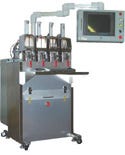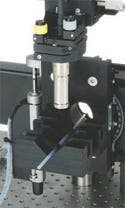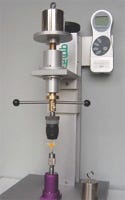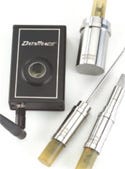Wireless data collected directly from patients during normal physical activities could enable the development of better knee implants
October 8, 2008
Originally Published MPMN October 2008
SPOTLIGHT
Process and Quality Control
Quality control testers
|
An equipment manufacturer partners with OEMs to create custom quality control testing systems for medical devices. One such partnership has yielded a tester that synthesizes human body conditions in a controlled and repeatable manner, according to the company. Designed to test and validate bandages that stop arterial bleeding on contact, the multistation quality control system tests batches of bandages at a time. The unit includes an electronic servo-hydraulic pressure system, a consumable test platform, a heating system, and a PC-based controller with a touch screen operator interface.
Altman Browning & Co., Portland, OR
www.altmanbrowning.com
Thickness-measurement system
|
Designed for quality control applications, a thickness-measurement system inspects products that are difficult to measure because they are constructed from a soft material or have curved or complex shapes. The OptiGauge system featuring superluminescent technology provides precise, nondestructive, repeatable measurements. Performing dimensional testing of wall thicknesses of products such as medical balloons, cones, and tubing, the system accommodates devices that are transparent, coated, or encased in wire mesh. Designed for quality assurance and production inspection requirements, it also can be used for determining product geometry during research and development stages to identify abnormalities in prototypes and to reduce time to market.
Lumetrics Inc., West Henrietta, NY
www.lumetrics.com
Testing services and equipment
|
A provider of testing services and equipment for medical products specializes in luer torque testing and gauging. Luer-lock fittings can be tested for unscrewing, leakage, and stress cracking. Syringes, needles, catheters, and other medical devices can be tested for such characteristics as manufacturing quality, cutting properties, penetration force, and kinking potential. Tests can be performed in the service provider’s laboratory as random tests or on a customer’s assembly line, and can also be customized to meet the requirements of a specific application. In addition to providing testing services, the company supplies quality control testing equipment for disposable medical products, including sharpness and tip-testing machines for needles, cannulae, and suture blades.
Melab GmbH, Leonberg, GERMANY
www.melab.de
Electrostatic voltage sensor
|
If left unchecked, electrostatic discharge (ESD) buildup can disrupt process and product integrity in the manufacture of semiconductor and other charge-sensitive components. To prevent adverse ESD events, an electrostatic equipment supplier offers instruments that measure the surface resistance of materials and objects to determine if they are in the proper resistance range to safely dissipate static charge to ground. The supplier’s Model 875 electrostatic voltage sensor is designed for monitoring ESD in production lines that manufacture electronic components for medical devices. The sensor’s probe automatically maintains high levels of accuracy and rates of speed over a variety of probe-to-monitored-surface spacings.
Trek Inc., Medina, NY
www.trekinc.com
Implantable device testing
|
Specializing in implantable medical device testing, a provider of testing services has enhanced its facility to increase testing capacity and to improve turnaround time for customers. The provider’s processes were strengthened by adding eight machines, including a spinal motion-preserving implant wear tester. Performing tests in both static and dynamic modes, the company offers quality assurance testing for a range of implantable medical products, including artificial disks, bone screws and plates, and reconstruction and replacement devices.
Empirical Testing Corp., Colorada Springs, CO
www.empiricaltesting.com
Data loggers
|
The ability to view process or validation data instantly can help save time and prevent mistakes on a manufacturing line. An existing data logger, the DataTrace system, has been combined with radio-frequency (RF) technology to enable real-time viewing of manufacturing processes. An alternative to existing wired logging systems and wireless data loggers, the RF-equipped system features software that can work with up to 250 DataTrace loggers to create a single, comprehensive monitoring system. The software also has an AutoRecover feature that ensures that 100% of the data processed by the system is received and stored in the system’s database for further analysis.
Mesa Laboratories Inc., Lakewood, CO
www.mesalabs.com
Coronary stent tester
|
A programmable multiaxial coronary stent testing unit simulates various combinations of deflections and displacements that vascular stents experience in vivo after deployment into coronary arteries. Performing bending, twisting, and stretching motions associated with systolic and diastolic cardiac cycles, the ElectroForce 9500 subjects multiple stents to user-controlled test conditions at the same time. Axial extension, torsion, bending, and other condition tests can be combined or performed independently. Servoelectric control of multiple axes enables reliable fatigue and durability evaluation of stents. Using a motion-predictive model, the tester also automatically compensates for cross-axis motion effects, simplifying test setup and control.
Bose Corp., ElectroForce Systems Group, Eden Prairie, MN
www.bose-electroforce.com
Copyright ©2008 Medical Product Manufacturing News
You May Also Like









